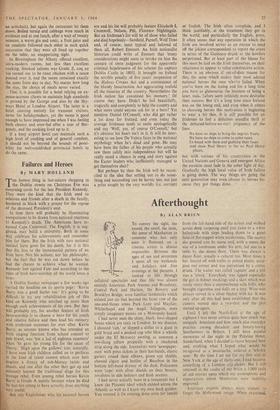Failures and Heroes
By MARY HOLLAND rr HE hottest thing in last-minute shopping in I the Dublin streets on Christmas Eve was mourning cards for the late President Kennedy. They were the kind that the Irish send to relatives and friends after a death in the family, bordered in black with a prayer for the repose of the deceased President's soul.
In time there will probably be illuminating comparisons to be drawn from national reactions to Kennedy's death. The Americans have re- named Cape Canaveral. The English, it is sug- gested, may build a university. Both in some way celebrate his achievements and remember him for them. But the Irish with sure national instinct have gone for his death, for it is this that fits him to the immemorial pattern of an Irish hero. Not his actions, nor his philosophy, but the fact that he was cut down before he had the chance to achieve what he wanted. Kennedy lost against Fate and according to the rules of Irish hero-worship all the world loves a loser.
A Dublin Sunday newspaper a few weeks ago carried the headline on its sports page: 'Kevin Barry was a good hurler too.' It's going to be difficult to try any rehabilitation job of this kind on Kennedy who notched up more than enough such achievements of his own. But they will .probably try, for another feature of Irish hero-worship is to choose a hero for his youth and relative failure and then load his memory with irrelevant successes for ever after. Kevin Barry, as anyone knows who has attended an Irish singing function from school concert to pub brawl, was 'but a lad of eighteen summers' when 'he gave his young life for the cause of liberty.' High upon the gallows' tree, naturally.
have seen Irish children called on to perform in the kind of talent 'contest which over here inspires a frenzy of sub-Mersey twists and shouts, and one after the other they got up and solemnly keened the traditional dirge for this teenage rebel. Even among rebel heroes Kevin Barry is Grade A mainly because when he died he was too young to have actually done anything very useful.
Ask any Englishman who his national heroes
are and his list will probably feature Elizabeth I, Cromwell, Nelson, Pitt, Florence Nightingale. But an Irishman's list will be of those who failed and died hopelessly—Sarsfield, Parnell, Wolf Tone and, of course, most typical and beloved of them all, Robert Emmett. An Irish nationalist historian could write of Emmett that 'many considerations might seem to invoke on him the censure of stern judgment for the apparently criminal hopelessness of his scheme [to capture Dublin Castle in 18031 It brought on Ireland the terrible penalty of live years' suspension of the Habeas Corpus Act and a continuance of the bloody Insurrection Act aggravating tenfold all the miseries of the country. Nevertheless the Irish nation has canonised his memory.' Of course they have. Didn't he fail beautifully, tragically and completely to help the country and what more could anyone ask for in a hero? Yet mention Daniel O'Connell, who did get rather a lot done for Ireland, and even today the average Irishman tends to smile apologetically and say 'Well, yes, of course O'Connell,' but it's obvious his heart isn't in it. It will be inter- esting to see .how De Valera fares in the national mythology when he's dead and gone. He may have been the father of his people who actually saw them safely into independence but will he really stand a chance in song and story against the Easter leaders who inefficiently managed to get themselves shot?
But perhaps by then the Irish will be recon- ciled to the idea that setting out to do some- thing and succeeding can be heroic too, not just a prize sought by the very worldly (i.e. corrupt)
or foolish. The Irish often complain, and I think justifiably, at the treatment they get in the world, and particularly the English, press. It often seems that any operation in which the Irish are involved serves as an excuse to send off the jokiest correspondent to report the event in terms of the Guinness drunk or the howlers perpetrated. But at least part of the blame for this must be laid on the Irish themselves, on their reluctance to appear to value constructive action. There is an obvious if out-of-date reason for this, the same which makes their most adored national heroes the men who've failed. When you've been on the losing end for a long time you have to glamourise the business of being a loser, mak,. failure seem infinitely more desirable than success. But it's a long time since Ireland was on the losing end, and even when it comes to choosing heroes this motivation is beginning to wear a bit thin. It is still possible for an Irishman to feel a delicious maudlin thrill at the defeated-before-we-start poignancy of the lines
We have no ships to bring the negroes Yeats, We have no ships to come to outer races.
To breed with them and gaelicise their faces And show Paul Henry in the. no Paul Henry places,
but with various of his countrymen in the United Nations and Geneva and emergent Africa the emotion must fade in the sober light of day. Gradually the high local value of Irish. failure is going down. The way things are going the next generation may even choose its heroes be- cause they got things done.






























 Previous page
Previous page